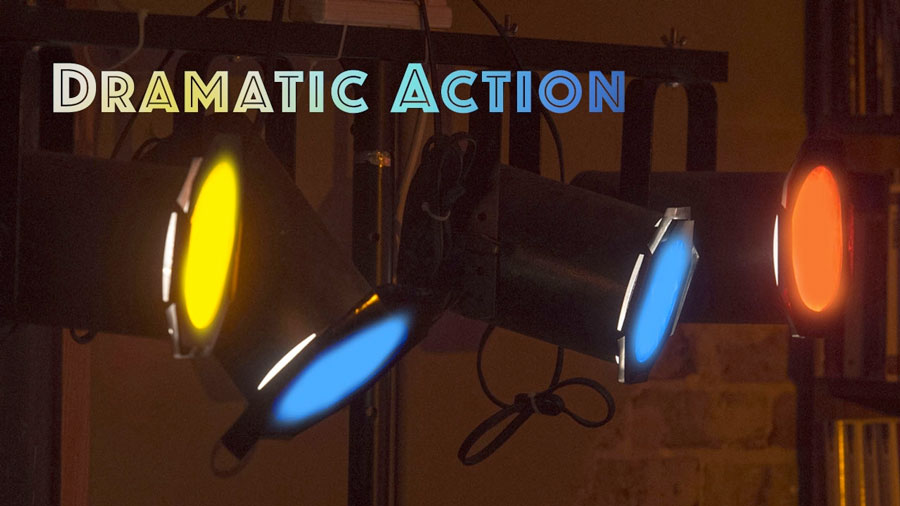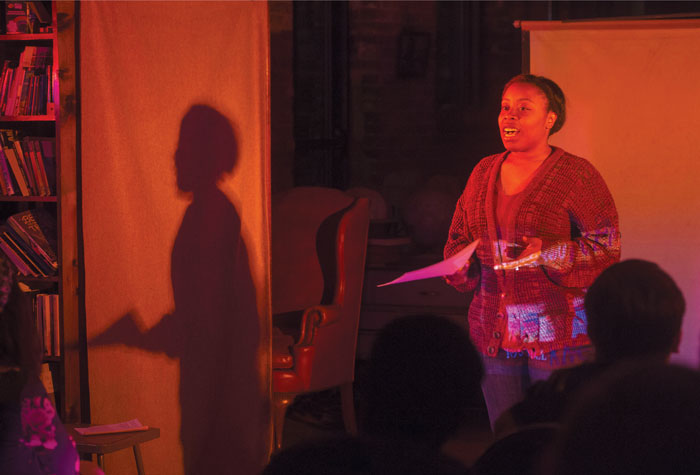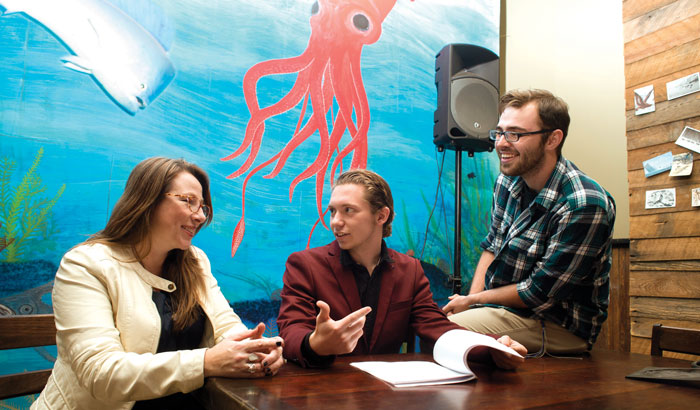Media contact: Tiffany Westry Womack, tiffanywestry@uab.edu
 Two weeks before her graduation in December 2016, English major Jasmine Shorter waited nervously with an audience filling a community center in Woodlawn. She would soon present a staged reading of a 10-minute play—her first as playwright.
Two weeks before her graduation in December 2016, English major Jasmine Shorter waited nervously with an audience filling a community center in Woodlawn. She would soon present a staged reading of a 10-minute play—her first as playwright.
For the Birmingham native, this project was different from previous writing assignments. Through Community Engaged Drama, a new service-learning course offered by the UAB College of Arts and Sciences Department of English, Shorter and her peers were challenged to give voice to complex social issues affecting the community—illiteracy, homelessness, and health disparities among them. The students partnered with local organizations that help people facing these challenges every day, writing the plays with them but also for them.
Course creator Nichole Lariscy, Ph.D., an associate professor of English, says that students can create transformative dialogue by crafting narratives around social concerns. “If expressive writing can have a healing effect on individuals, as studies have repeatedly shown, then expressive writing on a larger scale, like these engaged drama plays, can help heal communities,” she explains.
 Jasmine Shorter presents her play at Woodlawn's Desert Island Supply Company.
Jasmine Shorter presents her play at Woodlawn's Desert Island Supply Company.
Grounded in facts
Shorter, along with many of her fellow students, found the playwriting process daunting, yet inspiring. One after another, they say they felt driven to deliver works of meaning and impact after their first encounters with their partner organizations.
A passion for reading drew Shorter to work with STAIR (Start the Adventure in Reading), a program that pairs volunteer tutors with local second graders. There, she learned that 80 percent of Birmingham students miss third-grade reading proficiency benchmarks, a sure predictor of future academic performance. “I was astonished, but motivated to help,” she says.
Kane Agan, a junior public health major from Birmingham, selected Hope Hospice to honor a family friend who recently received end-of-life care. “As a patient, a hospice worker, or a loved one, the process is difficult,” he says. “There is something incredibly admirable about those with the strength to make it through.”
For Tanier Dutton, working with the Literacy Council of Central Alabama was eye opening. The junior English major from Carbon Hill, Alabama, was distressed to learn that 15 percent of the state’s population is considered functionally illiterate. As he shadowed the Literacy Council’s mentors and its adult students, the issues surrounding illiteracy began to take shape—and become human.
| TATIANA, a student: “In the end the only thing I seemed to do is fade. My work got harder to copy — even the math was full of words and letters — and my confidence got lower. I went from the front row of the classroom to the back corner. I’ll never forget when the English teacher tried to make me read out loud. Somebody else in the room screamed, she can’t read — and everybody laughed.” —Excerpt from No Child Left Behind, by Jasmine Shorter |
Narrative freedom
Working with community partners to learn the facts and hear different viewpoints about social challenges helped students develop their story structures and characters. But finding the right voice was a struggle at first, they say.
“The most challenging thing has been coming to terms with how much liberty that I, as the playwright, can take with the work because I have a duty to the art itself, but also to the community that it represents,” Dutton says.
Lariscy describes the process as “artistic intervention,” allowing the playwright to tackle an important issue in a nonconfrontational way, using whatever voice and approach he or she deems valid. “Narrative is inherently inarguable,” she explains. “That is, it can bring up controversial topics, but the story itself can’t be argued. The points behind it can, of course.”
 (From left:) Nichole Lariscy preps students Kane Agan and Tanier Dutton for the staged reading.
(From left:) Nichole Lariscy preps students Kane Agan and Tanier Dutton for the staged reading.
Dramatic arc
Lariscy encouraged students to create “high stakes” to capture the audience and build tension. “Start with facts, but don’t be afraid to introduce an aspect of fantasy,” she advises. “Give people a break from hard-core realism, but don’t avoid witnessing hard truths.”
Tutoring work with a STAIR student helped Shorter create a framework for her narrative. In her heartbreaking monologue, No Child Left Behind, Shorter shares the thoughts of a fictional student struggling so much to keep up that she eventually drops out of high school.
“I took it from the perspective of what would happen if the STAIR program didn’t exist,” Shorter says. “I wanted to highlight the program’s work, but on a deeply personal level.” She hopes the organization can use the finished work as a fund-raising tool.
Agan faced similar challenges in balancing an intimate portrayal with an organizational mission. Participating in home sessions with Hope Hospice patients and social workers, he became keenly aware of the need for both education and empathy.
His play, Echo, tells the poignant story of a hospice patient interacting with her family. “My ‘big ask’ to the audience,” Agan says, “is, ‘Everyone will die, and everyone will experience the death of another person in their lifetime, so why is it so hard to talk about?’” He added threads of comic relief to keep the audience engaged, yet was careful not to dilute the issue.
Agan plans to develop his 10-minute play into a longer production with additional characters and sets. He also will continue volunteering with Hope Hospice.
Like his peers, Dutton chose to face hard truths head on. During a Literacy Council mentoring session, he noticed an adult student carrying the Bible and was inspired to use the familiar object as a symbol of illiteracy’s profound impact.
In Dutton’s Sundee Mornin’ Digest, the central character is in crisis when he realizes his life and faith are based on what others have told him, not on what he has read himself. “I’ve created a real character who is struggling with a real situation,” Dutton explains. A wider audience will see his work this spring when the Literacy Council hosts another staged reading of the play at a local library.
| THOMAS: “All my life, people been readin’ to me—been tellin’ me what to believe — I couldn’t tell you what any of this says. How do I know what they tole me is true?! How do I know that this is true?!” (Waves book; loudly and angrily says) “I ain’t ever read a word that told me it was true!” —Excerpt from Sundee Mornin' Digest, by Tanier Dutton |
Stories of service
Following the nerve-rattling presentation to the Woodlawn audience of peers and partner organizations, Shorter and her fellow students could breathe a sigh of relief. All of them felt a deep sense of accomplishment and pride in speaking for people and issues that don’t often see the spotlight.
Inspiring that feeling of responsibility toward others is the essence of service learning, Lariscy notes. She hopes the participating organizations feel that their needs were heard and accurately reflected in the students’ plays—and that the narratives encourage further dialogue in the community. For students, she believes the course teaches skills that each will take forward into their careers.
Dutton has his sights set on becoming an educator, while Agan plans to specialize in art history and public health, with a goal of working for the United Nations. Shorter will pursue a law degree focusing on health or education. In each of these endeavors, the ability to listen, examine multiple viewpoints, and then craft a compelling story will be invaluable—and provide the power to help heal communities.
| AMET, considering his last words to his dying mother: “There’s so much I need to say, and I don’t know what to. I mean, will you remember anything if I say it?” Later, the hospice patient and mother, JOYCE, speaks to her children after her death in the form of a dream: “What I argue is important is that you’re still here. And as long as y’all are, I am.” —Excerpts from Echo, by Kane Agan |